The Centre for Policy Development is making available a range of policy proposals and materials relating to the delivery of employment services in Australia.
These materials are representative of CPD’s mission to boost economic and social outcomes for disadvantaged Australians. A core part of this mission is exploring practical interventions to support Australians facing entrenched unemployment and underemployment. This challenge grows with every day of COVID-19. There has been lots of talk about jobs and boosting demand but not as much focus on how our job services system can do much better at the regional and local level.
These materials being released are the result of several years of work by CPD and have emerged after extensive consultation with a diverse group of stakeholders from across government, business, social services, philanthropy, and community organisations. There are three elements: (1) our Blueprint for Regional and Community Job Deals; (2) a proposed Jobs Taskforce for Western Melbourne; and (3) the materials from our Transitions to Employment roundtables.
 |
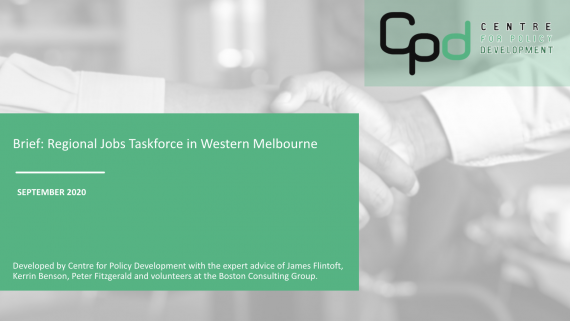 |
| Blueprint: Regional and Community Job Deals | Jobs Taskforce in Western Melbourne |
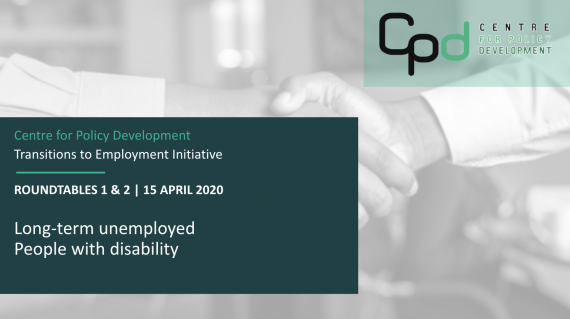 |
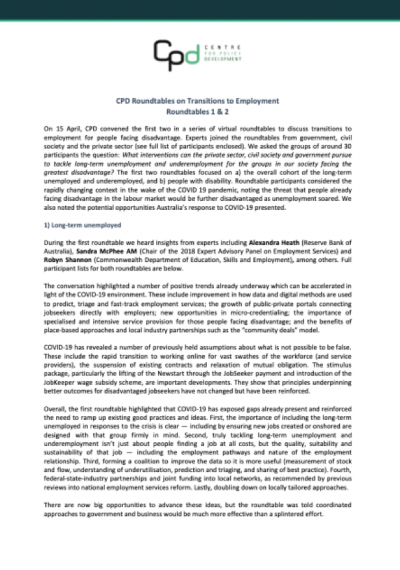 |
| Transitions to Employment Roundtables One and Two: Background materials | Transitions to Employment Roundtables One and Two: Summary and Participant list |
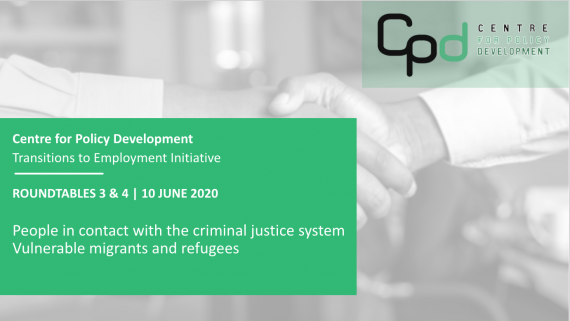 |
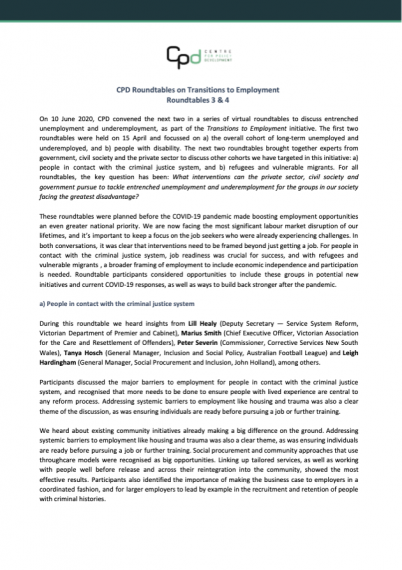 |
| Transitions to Employment Roundtables Three and Four: Background materials | Transitions to Employment Roundtables Three and Four: Summary and Participant list |
The first element is CPD’s Blueprint for Regional & Community Job Deals. The blueprint advances CPD’s work on improving employment services in place by showing how this approach can be scaled up across the nation in pivotal regions and places. It illustrates a pathway for implementing, governing and funding place-based initiatives for long-lasting impact on our jobs crisis. It includes a toolkit with practical implementation tips for people and organisations at the forefront of local responses. The blueprint shows how governments, business and philanthropy can support similar approaches across the country in a coordinated way so that vulnerable jobseekers are front of mind on our way out of COVID.
The release of the blueprint coincides with the recent announcement by the Federal Government of the Local Jobs Program and the formation of 25 Local Jobs and Skills Taskforces across the country. CPD, alongside organisations such as the Brotherhood of St Laurence and the Australian Council of Social Service (ACOSS), have long been advocating for regionally tailored responses to be prioritised when it comes to tackling entrenched unemployment, most notably through our Cities and Settlement Initiative. We hope the blueprint and its supporting materials can help to make the Local Jobs Program and its Taskforces as effective as possible. We intend for this to be a living document, one that naturally evolves and responds to the ever-changing employment landscape. As such, we will be continuing consultations with business, government, philanthropy, social services and others to ensure that it continues to be a valuable resource in achieving better outcomes for disadvantaged job seekers.
The second element proposes a Jobs Taskforce for Western Melbourne, one of the employment regions hardest hit by COVID-19. In doing so, we provide an example of what the implementation of the blueprint would look like in practice. While the Local Jobs Program is a good first step, much more will be necessary to deliver a unified, enduring approach in these regions that draws in complementary support from state government, industry, social services and philanthropy — and underpins the new employment services system when it starts in 2022. This proposal shows how that can be done.
The final element is the materials from our Transitions to Employment roundtables held virtually between April and June. Organised and convened by CPD, the roundtables considered interventions that government, business and philanthropy could pursue to tackle long term unemployment and underemployment for the groups in our society facing the greatest disadvantage. Each roundtable was made up of a range of experts from government, civil society and the private sector, and focussed on a specific cohort of jobseekers. The first two discussions focussed on the long-term unemployed and underemployed, and people with disability. The second two roundtables focussed on people in contact with the criminal justice system, and vulnerable migrants and refugees. The roundtables were able to consider the impacts of COVID-19 and what the pandemic means for the range and scale of responses that must be considered.
CPD is grateful to all those involved in developing these materials and hopes they can help Australian communities to build back better in the wake of COVID, and for our most vulnerable jobseekers to be better supported.
Much of the material in the blueprint has emerged from CPD’s Cities and Settlement Initiative (CSI), a 3-year program focused on employment and settlement services for refugees and humanitarian migrants. It was through CSI that CPD developed its Community Deals model, working closely with the City of Wyndham and other local communities. CSI has been made possible by the generous support of the Myer Foundation, the Vincent Fairfax Family Foundation, the Cameron Foundation, the Lord Mayor’s Charitable Foundation and a group of volunteers from the Boston Consulting Group.
The blueprint itself was compiled by CPD, with expert advice from Peter Fitzgerald (former Deputy Secretary, Victorian Department of Health & Human Services), Kerrin Benson (former CEO, Multicultural Australia) and James Flintoft (former CEO, Regional Development Victoria).
CPD’s Employment Transitions Initiative was supported by the Paul Ramsay Foundation.
Quotes from CPD on the release of these materials:
Travers McLeod (CEO)
“The Local Jobs Program accepts just how important locally and regionally focussed responses are in addressing the jobs crisis Australia is experiencing. The challenge now is to deliver a unified, enduring approach in these regions that can deliver for all Australians — one matched with significant stimulus and job creation measures.
“CPD’s blueprint draws on extensive consultations and successful Australian and international case studies. It illustrates a pathway for implementing, governing and funding place-based initiatives for long-lasting impact. Locally and regionally tailored approaches must be sustained for the long term. This means building genuine partnerships between three levels of government and business, providing sustained support to local and regional governance arrangements, and re-orienting our big service systems, like jobactive.”
“The Wyndham Employment Trial has shown how positive employment outcomes can be achieved by promoting tailored, coordinated services that engage local employers and industry. The blueprint shows how governments, business and philanthropy can support similar approaches across the country in a coordinated way so that the vulnerable jobseekers are front of mind on our way out of COVID.”
Terry Moran AC (CPD Chair and Chancellor of Federation University)
“I am proud of the work CPD has done to set out in exacting detail the best possible means of setting up place-based initiatives to help the unemployed and activating critical networks at regional and local level.”
“Post-secondary education institutions need to realise they have a particularly strong role to play in securing return to employment or introduction to employment of the large numbers of people who have had their livelihoods disrupted by this crisis.”
Sam Mostyn (CPD Deputy Chair)
“By listening to, and learning from, communities, CPD and organisations like the Brotherhood of St Laurence and ACOSS have developed models for genuine partnerships between government, business and communities that achieve better outcomes for those who need them most.”
Links and related reading:
- Blueprint: Regional and Community Job Deals
- Jobs Taskforce for Western Melbourne
- Media Release
- Travers McLeod, “Democracy can never be sublet”, op-ed for The Australian, 13 July 2020
- Cities and Settlement Initiative
- Media Release on the Local Jobs Program and Taskforces from the Commonwealth Minister for Employment, Skills, Small and Family Business
- Further information on the Local Jobs Program from the Commonwealth Department of Education, Skills and Employment
- Victorian Inquiry into Sustainable Employment for Disadvantaged Jobseekers
- “I want to work” — report of the 2018 Employment Services Expert Advisory Panel
- CPD submission to 2018 Employment Services Expert Advisory Panel



